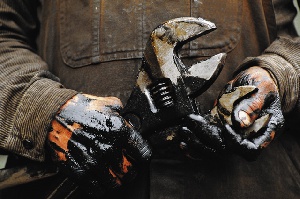Even though Ghana started producing oil in commercial quantities on December 15, 2010, the country’s oil law is said to be outmoded.
The Petroleum Exploration and Development Law (PNDCL 84) of 1984 could though be regarded as an oil law put in place to guide the country’s oil industry as far back as 1984 during which time the oil had not been found, Allan Lassey, an extractive resource governance advisor, has pointed out.
He was speaking at the Regional Extractive Industries Knowledge Hub Summer School at GIMPA in Accra yesterday.
A draft is currently being prepared to amend the law and incorporate all relevant areas that need to be covered as far as the operations in the oil industry is concerned.
“That law, in practice, is inadequate to govern emerging industries. There’s a huge gap in terms of our regulatory system. We should also ensure that our resources management is effected by competent capacities of human and material resource. Additionally, there’s the need for capacity from the state agencies to match the oil companies so the country is not short-changed by oil companies.”
Mr Lassey also said governments (both past and present) have not paid adequate attention to the acquisition of equipment needed for the oil and gas industry, adding, “We don’t have effective and efficient equipment for oil volume measurement and gas flaring, among others, but when our authorities get money from taxes and royalties collected from these oil companies, they decide to go and purchase four-wheel drive vehicles for distribution among themselves.”
However, Dr Gheysika Agambila, a senior lecturer at GIMPA, responding to the assertion that Ghana’s oil law was archaic, said Ghana’s oil law had been touted as one of the best in the whole of Africa.
He said a few areas needed to be updated to contemporary levels to match up the demands of the industry.
General News of Friday, 20 July 2012
Source: Daily Guide













